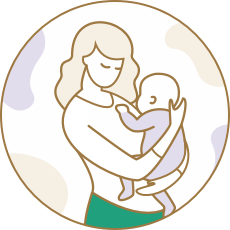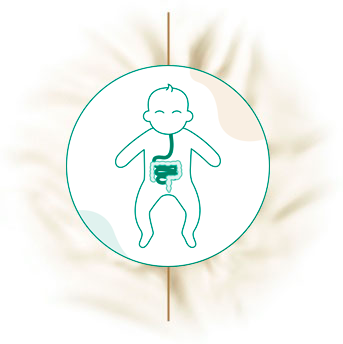IMPORTANT NOTICE: Breastfeeding is best for infants and is recommended for as long as possible during infancy. Alimentum and EleCare are infant formulas for special medical purposes and should only be used under the recommendation or guidance of a healthcare professional.
*Data from infants with CMA or suspected CMA (n=200) and infants who did not have CMA (n=200) and who were exclusively formula fed. Data from the first 12 months of life were collected through general practitioners; GPs did not indicate whether illness occurred before or after diagnosis.
†Number of hospital admittances (does not have to include an overnight stay) related to skin, respiratory, and gastrointestinal disorders in the past 12 months.
‡Mean number of total GP appointments for medical issues related to skin, respiratory, and gastrointestinal disorders in the past 12 months.
§Number of attendances at A&E or out-of-hours urgent care related to skin, respiratory, and gastrointestinal disorders in the past 12 months.
2’-FL: 2’-fucosyllactose; CMA: cow’s milk allergy; GI: gastrointestinal; HMO: human milk oligosaccharide; IgA: immunoglobulin A; IgG: immunoglobulin G; IgM: immunoglobulin M; IL: interleukin; TNF: tumour necrosis factor; WHO: World Health Organization.
References
1. Oddy WH. Ann Nutr Metab. 2017;70(suppl 2):26–36. 2. Kainonen E, Rautava S, Isolauri E. Br J Nutr. 2013;109(11):1962–1970. 3. Boix-Amorós A, et al. Nutr Rev. 2019;77(8):541–556. 4. Braun J, Stiehm ER. The B-lymphocyte system. In: Stiehm ER (ed). Immunologic Disorders in Infants and Children. Philadelphia: WB Saunders; 1996. p.35–74. 5. Blanco E, et al. J Allergy Clin Immunol. 2018;141(6):2208–2219.e16. 6. Dzidic M, et al. Med Sci (Basel). 2018;6(3):56. 7. Reverri EJ, et al. Nutrients. 2018;10(10):1346. 8. Abbott. Patient Record Study: CMA vs non-CMA infants. Insights from Adelphi Research. 2020. 9. Gdalevich M, et al. J Am Acad Dermatol. 2001;45(4):520–527. 10. Bachrach VR, Schwarz E, Bachrach LR. Arch Pediatr Adolesc Med. 2003;157(3):237–243. 11. NICE. Cows’ milk allergy in children. Available at: https://cks.nice.org.uk/cows-milk-allergy-in-children#!backgroundSub:2 (accessed December 2020). 12. Fox A, et al. Clin Transl Allergy. 2019;9:40.
IE-SIMILAC-2100003 February 2021





